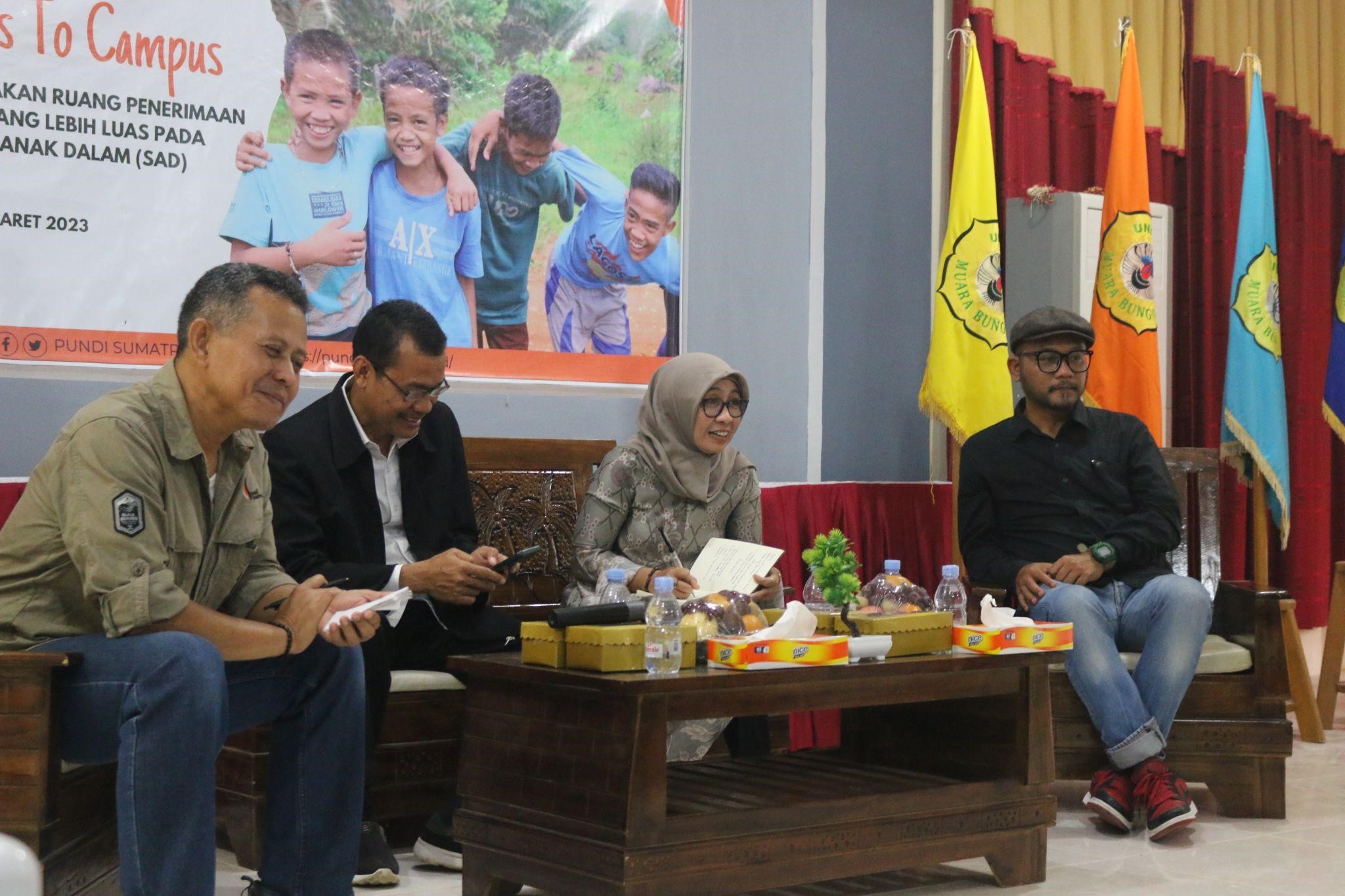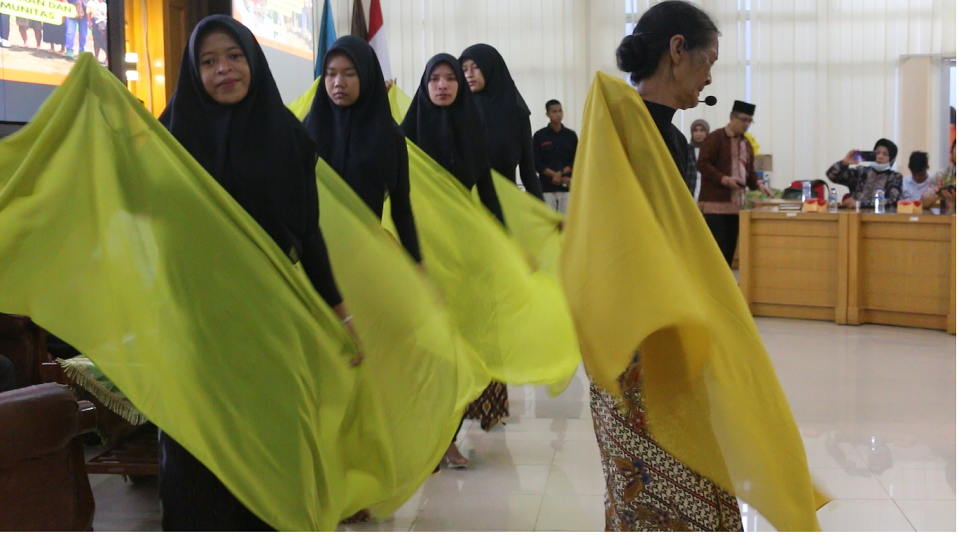
Pundi Sumatra Invites Millennials To Know About Children Empowerment Activities In (Sad) Through Inclusion Goes To Campus
Since 2012 Pundi Sumatra has been empowering the Suku Anak Dalam (SAD) along the central Sumatra highway. Along this journey, the institution which was established in 2006 garnered support from various parties to be involved in encouraging social change and expanding the social inclusion movement as an approach chosen in an effort to create a much more decent quality of life for the SAD group through various good practices.
Encouraging the social inclusion movement as a massive movement certainly cannot ignore the role of millennials in higher education institutions. Entering a decade of empowering SAD, Pundi Sumatra is increasingly collaborating with universities in Jambi Province in program collaboration practices. This is in line with the implementation of the Tri Dharma of higher education, namely development, service, and research which are the foundation for being able to produce quality students and can become agents of change, as providers of solutive action for society.
Based on this, in early March, Pundi Sumatra held an Inclusion Goes to Campus event at two tertiary institutions in Jambi Province, namely at Muara Bungo University (UMB) and Jambi University (UNJA). After signing the memorandum of understanding at these two tertiary institutions, the Goes to Campus Inclusion activity was the first step taken to introduce the SAD empowerment program to the entire academic community, especially the millennial group.

At the implementation of Inclusion Goes To campus at the University of Jambi (06/03/23), Bejujung (23) and Besiar (23), SAD children who are currently studying at the UNJA Faculty of Agriculture were also present. Also present were Juliana (21), who is currently studying at the Department of Forestry, University of Muhammadiyah Jambi, and 6 young SAD cadres from the Pundi Sumatra target site in Pelepat District, Bungo Regency.
On the occasion of the discussion session, CEO of Pundi Sumatra, Dewi Yunita Widiarti said that the social inclusion approach taken for the Suku Anak Dalam (SAD) aims to ensure broad community acceptance of the SAD community, because the SAD community is part of Indonesian citizens who have the same rights to be able to access all basic services provided by the government. Assistance is an effort to fight for the fulfillment of these rights, and empowerment is a strategy to increase the resilience of the community, to be able to survive and be independent towards a much better quality of life in the future.
"Our working principle is collaborative parties, even if younger students want to participate in this process, of course we accept it with pleasure and open arms, because this empowerment work always requires new innovations and creative ideas.,” he said.
Basic services of concern to these indigenous communities include education services, health services, economic development, and policy advocacy. To achieve maximum results from various perspectives, Dewi also explained the empowerment strategies that had been implemented, namely live-in assistance, encouraging regeneration at the youth level, strengthening local institutions, strengthening collaborative parties, and integrating empowerment programs with village programs.
“Salah satu strategi pendampingan kita ini adalah live in, artinya tinggal bareng dengan warga SAD di sana. Live in kami percaya menjadi satu strategi yang efektif untuk membangun investasi sosial dalam proses pendampingan. Mengikuti rombong pergi berburu juga kita lakukan, untuk mendapatkan kepercayaan dari komunitas selain juga jauh lebih mengenal adat dan budayanya,” terangnya lagi.
Akademisi dari UNJA, Dr. Fuad Muchlis, S.P., M.Si, juga menyatakan bahwa Suku Anak Dalam harus beradaptasi dengan perubahan karena sumber daya alam semakin menipis.
"SAD yang tinggal di kawasan taman nasional sangat bergantung pada hutan untuk meramu atau berburu,” katanya. Ia juga mengatakan bahwa hanya sedikit dari ribuan SAD yang tinggal di beberapa wilayah yang melanjutkan pendidikan ke perguruan tinggi. Ini merupakan fenomena yang memerlukan solusi bersama karena hutan semakin berkurang dan populasi mereka terus meningkat.

On this occasion, a group of women from the Dwi Karya Bakti Village SAD community, Bungo Regency, had the opportunity to perform the Bedeti Dance. Nurbaeti or Mak Nur becomes the woman who stands at the front to recite sentences containing prayers and adoration, while 4 young women behind her simultaneously follow the rotating movement that Mak Nur is doing. The four young women are Juliana, Amira, Siska and Tira; yellow scarves and jarik cloth wrapped around the bodies of these five women. Bedeti dance is one of the remaining cultural assets of the Anak Dalam Tribe and needs to be preserved so that it is not extinct and forgotten.

The implementation of the Goes to Campus Inclusion roadshow in these 2 locations was also filled with the screening of the film Pulang Rimba by Jogjakarta's Peace Prasasti Creation (KPP). The documentary film itself tells the story of a young Orang Rimba named Mt. Pauzan (24) is currently studying at the Bogor Agricultural Development Polytechnic (Polbangtan), and is already in his 5th semester.
The director of the film Pulang Rimba, Rahmat Triguna alias Mamato, stated that the reason for filming the story of the Orang Rimba stems from his sense of empathy. Where to this day, no SAD child has succeeded in holding a bachelor's degree.
"So the film that we made was to spark discussion, in the film Pulang Rimba, where the main character was Pauzan, we called it a credible voice. Why Pulang Rimba, because later when Pauzan has graduated he will return to his village to build a more modern agriculture based on the knowledge he got in college,” said Mamato.
The film was completed at the end of 2022, departing from research of around 3 months. Bonding trust or the process of building trust with Orang Rimba so that they want to be filmed, according to Mamato, is a separate challenge in the film production process.
Currently, Mamato and his team, produced by Anisa Triguna, are shooting the sequel to the film Pulang Rimba II. Both Pauzan, Bejujung, Besiar or Juliana have almost the same dynamics. They "against" adat by going to school to higher education. It is precisely that story that is interesting to bring up, how the struggle to go to school for the indigenous people of SAD is not easy.
